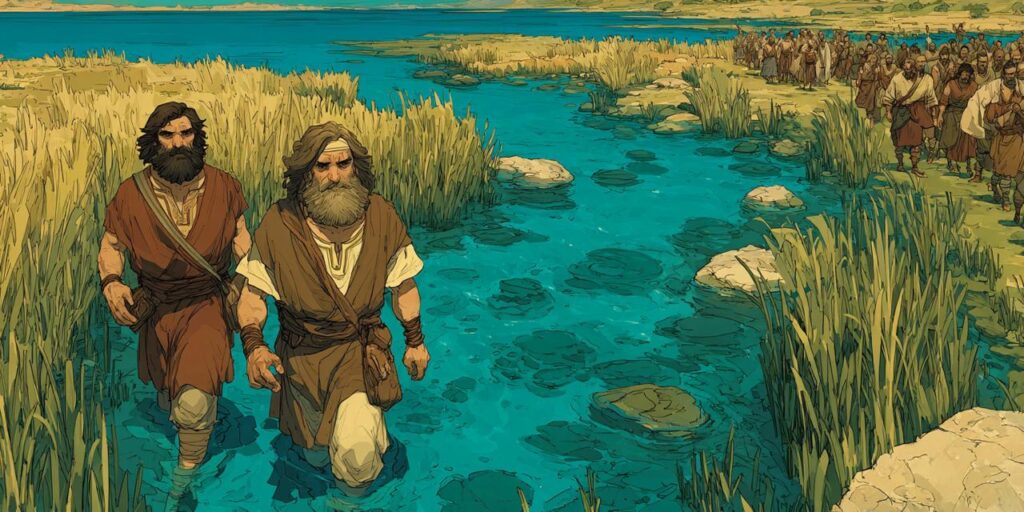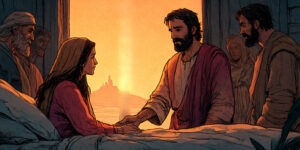
Peace
The gospel claims something bold: God offers real peace. Peace with Him, peace inside yourself, and peace with other people. But that peace isn’t automatic…

“Then we set out from Horeb and went through all that great and terrifying wilderness that you saw, on the way to the hill country of the Amorites, as the Lord our God commanded us. And we came to Kadesh-barnea. And I said to you, ‘You have come to the hill country of the Amorites, which the Lord our God is giving us. See, the Lord your God has set the land before you. Go up, take possession, as the Lord, the God of your fathers, has told you. Do not fear or be dismayed.’ Then all of you came near me and said, ‘Let us send men before us, that they may explore the land for us and bring us word again of the way by which we must go up and the cities into which we shall come.’ The thing seemed good to me, and I took twelve men from you, one man from each tribe. And they turned and went up into the hill country, and came to the Valley of Eshcol and spied it out. And they took in their hands some of the fruit of the land and brought it down to us, and brought us word again and said, ‘It is a good land that the Lord our God is giving us.’
“Yet you would not go up, but rebelled against the command of the Lord your God.Deuteronomy 1:19-26
We often sing hymns about surrendering everything to God. The words roll easily off our tongues—“I surrender all”—but living them out is much harder. Deuteronomy 1:19–26 reminds us of one of Israel’s greatest struggles: trusting God enough to say yes when He calls us forward.
Living in Italy, we know August is a month of holidays. Ferragosto began as a festival centuries ago, when roles were reversed, work stopped, and feasting took over. Today, many Italians spend weeks at the beach or in the mountains with family. It’s a time of rest—good in its own way, but not particularly holy.
Jewish holidays, however, are different. They are not merely vacations but holy days, grounded in history and God’s dealings with His people. One such day is Tisha B’Av, the ninth of the Hebrew month of Av. Unlike Ferragosto, it is not a celebration but a time of mourning. For three weeks leading up to it, the Jewish community remembers tragic events tied to disobedience and failure to trust God.
And it all begins with the story in Deuteronomy.
Deuteronomy summarizes Israel’s history: slavery in Egypt, deliverance through the plagues and the Red Sea, God’s provision in the desert, and the approach to the Promised Land.
At Kadesh Barnea, they faced the defining choice: would they trust God and enter the land He promised? Spies were sent. Joshua and Caleb returned with confidence, urging, “We can do this—God is with us!” But ten others said, “No, it’s too dangerous.”
The people listened to fear instead of faith. God said “Go,” but they said “No.” That single refusal became known as Israel’s greatest national mistake, shaping centuries of struggle and sorrow remembered during Tisha B’Av.
Israel’s journey mirrors our own. In Christ, we’ve been freed from slavery to sin and invited into a new life filled with His Spirit. Yet every day, we face the same question: Will we say yes to God’s leading, or will we shrink back in fear?
This passage teaches us:
Disobedience carries consequences. Israel’s refusal led to decades of wandering and later tragedies. Our choices also sow seeds—whether of trust or rebellion—that eventually bear fruit.
Integrity matters. Like the parable of the boy with the boiled seed, honesty before God produces lasting growth. Pretending leads only to loss.
Whose voice do we trust? Job’s story reminds us that even well-meaning friends can give bad advice. The best wisdom comes from God Himself, often requiring us to be silent and listen.
Comfort can become a trap. Like the traveler who settled in a pleasant village and forgot his destination, we can grow too content in this world and lose sight of God’s promises.
Faith means action. Caleb silenced the doubters and declared, “We can certainly do this.” Not because of human strength, but because God had spoken.
Tisha B’Av reminds the Jewish people of their greatest mistake. For us, it is also a warning: when God says, “Let’s go,” we cannot afford to respond with “No.”
Faith grows when we trust Him beyond what we can see, when we silence fear and listen for His voice, and when we walk forward in obedience.
Because in the end, God doesn’t call us to comfort—He calls us to a life of promise. And every day, the choice is before us: Ten were wrong. Two were right. Which will we be?

The gospel claims something bold: God offers real peace. Peace with Him, peace inside yourself, and peace with other people. But that peace isn’t automatic…

Advent starts by asking us to slow down and look past the distractions. Every culture wraps Christmas in its own extras—traditions, shopping, decorations, sentimental ideas.

After Paul left Galatia, other teachers came. They questioned Paul’s authority and offered the Galatians a far more “comfortable” message…

Jesus leaves the synagogue in Capernaum and steps into a home. Simon Peter’s mother-in-law lies with a high fever.